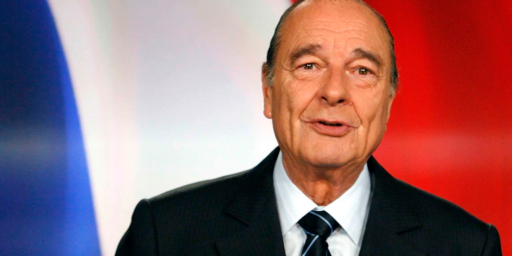FRENCH RELATIONS
RealClear Politics, a superb op-ed clipping service that I use pretty much daily, has a collection of pieces on France today. Irwin Stelzer believes the US-France relationship is permanently altered:
So did George Bush really, really mean it when he promised Jacques Chirac that he would never forgive or forget French perfidy and France’s machinations at the UN during the run-up to the war for regime change in Iraq? The short answer is “yesâ€.
The emerging European superstate is seen by France as a rival to the US, not an ally. The euro is seen less as a facilitator of intra-EU trade than as a rival to the dollar, which is why Europe̢۪s politicians are chortling about its recent rise, despite the devastating effect that is having on the economies of euroland. And the new European Defence Force is clearly aimed by France at becoming a substitute for, rather than the supplement to, Nato that Tony Blair hoped it would be.
* * *
David Ignatius agrees:
American anger toward France was reignited last weekend by remarks that de Villepin made at Versailles to a foreign-policy gabfest known as the Bilderberg meeting. It was only because Chirac and Pope John Paul II opposed the American war in Iraq that the world was able to avoid a Christian-Muslim “clash of civilizations,” de Villepin reportedly said. He implied that if America had just made clear from the outset that its goal in Iraq was regime change, then the French might have been willing to go along.
Chirac is following a traditional dictum of French foreign policy, namely: How do you maintain and enhance France’s power in a world that is dominated by America?
Ignatius’ credibility is somewhat undermined by this bizarre bit of moral equivalency:
The American response to his manipulations, alas, seems overwrought. For the White House to disclose that Air Force One is serving “freedom toast” is at least as childish as anything the French have done.
I agree that it’s silly; that it is equivalent to selling arms to our enemy and taking other steps that likely resulted in the death of more American troops in Iraq is absurd. Nonetheless, this conclusion is hard to dispute:
Still, Chirac’s riposte to America will almost certainly fail. Paris lacks the military might to translate its ambitions into reality. And while Germany and Russia may share French wariness of the Bush administration, they are unlikely to underwrite Chirac’s continuing defiance of Washington.
The French version of optimism these days is that things will get better once Bush is gone from the White House. But in this, as in too many other foreign-policy judgments, the French appear to be making a costly mistake.
Finally, Christopher Dickey and Tracy Mcnichol argue that both sides are being silly and shoud play nice.
Like it or not, Bush and Chirac are going to get a lot of face time at Evian, and overt snubs will simply look silly. “The American reaction [to France] is very emotional and, on the part of some people in the administration, a bit infantile,†says Olivier Roy, a French academic. Bush’s spokesmen recently let it be known that Chirac won’t be invited to the ranch in Texas. Is that threat really supposed to be taken seriously? asks Roy. Perhaps it’s time for both men to stop posturing about power and use their strengths to make the world more prosperous and safe than it seems right now.
The piece actually has some interesting points about behind-the-scenes changes in the French attitude, although it is interspersed with nonsense like, “France’s greatest abilities, however, lie in the fields of diplomacy.” Right. Nothing like alienating the world’s greatest military, economic, and cultural power in a failed quest to stop an inevitable war against a tyrant to bolster one’s bona fides.



